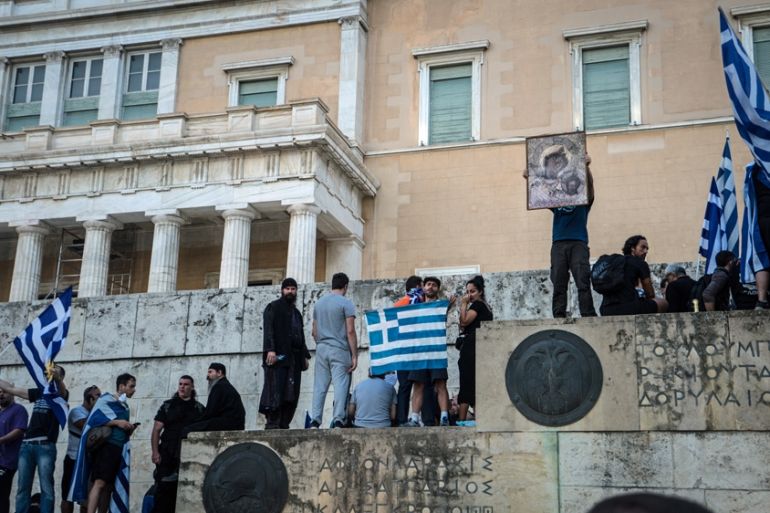Greek PM Tsipras survives no-confidence vote over Macedonia deal
Greek MPs reject censure motion brought by the main opposition party over a deal to change the name of Macedonia.

Greece’s government has survived a no-confidence vote over a deal to end a bitter decades-long name dispute with its northern neighbour which called itself Macedonia at the break-up of the former Yugoslavia.
Parliamentarians voted 153-127 to keep Prime Minister Alexis Tsipras’s administration in place.
The coalition government, led by left-wing Syriza, needed at least 151 of its 154 members of parliament to vote against the proposal.
The coalition’s junior partner – the Independent Greeks (ANEL), a right-wing party – says it opposes the deal but only one of its MPs backed the censure motion in parliament. Panos Kammenos, leader of ANEL and defence minister, subsequently kicked the lawmaker out of the party.
The motion was brought by the conservative New Democracy party which accused the government of making too many concessions over the agreement which will eventually see the small country – which declared independence from Yugoslavia in 1991 – renamed the Republic of North Macedonia.
“Today, you are all mortgaging the future of the country,” Kyriakos Mitsotakis, the New Democracy leader, told parliament ahead of the vote.
Addressing Tsipras, Mitsotakis added: “You will be the prime minister to say ‘Yes’ to everything your predecessors said ‘No.'”
In response, Tsipras accused Mitsotakis of political opportunism and “of being hostage of the far-right wing of your party”.
Talking about the deal, Tsipras described it as good, adding “that any Greek prime minister after 1995 and the interim agreement would like to have on the table.”
“It not only includes a compound name with a geographic qualifier, used erga omnes, but also sets as a condition a change of the constitutional name by which the country has been recognised by 140 countries. It includes a constitutional change to eradicate every irredentist term in their constitution,” Tsipras pointed out.
Outside the parliament building in the capital, Athens, police earlier fired tear gas as thousands protested against the deal.
The parliament debate, which stated on Thursday, was marred by a rant by an MP of the far-right Golden Dawn party on Friday who urged the army to arrest Tsipras, Kammenos and President Prokopis Pavlopoulos because of the agreement.
North Macedonia
The deal to rename Greece’s northern neighbour North Macedonia was announced on Tuesday by the prime ministers of the two countries after six months of talks to end the 26-year standoff.
Greece has long objected to the former Yugoslav state calling itself Republic of Macedonia, which it said implied territorial aspirations on its northern region of the same name.
Since the fall of communism, Greeks have called the country to their north Skopje, after its capital city, and its people and their language as Skopjan.
The New Democracy party said the deal brokered by Tsipras and his counterpart, Zoran Zaev, is “opposed by the overwhelming majority of Greek people”.
In Skopje, there has also been a heavy backlash against the agreement, with the president declaring his refusal to sign off on the deal. The agreement must clear the hurdles of parliamentary ratification, a referendum in September and a constitutional amendment.
In Athens, the deal only faces ratification in parliament once Skopje has completed its part of the process.
ANEL says it will not support it when it comes up for ratification in parliament. That would leave Tsipras dependent on opposition parties to pass the measure.
Under the agreement, which is tentatively scheduled to be signed on Sunday, the country’s Macedonian language and nationality is sanctioned, albeit with the proviso that they are of Slav, not ancient Greek, origin.
North Macedonia would agree that its “official language and other attributes … are not related to the ancient Hellenic civilisation, history, culture and heritage of the northern region of [Greece] ” and would make constitutional changes to remove claims on Greek soil.